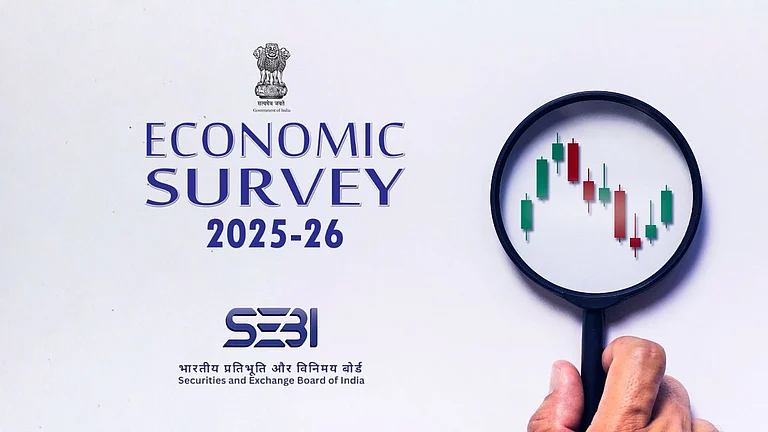Defence stocks continued to trade under pressure on July 21 amid a volatile session. The Nifty India Defence also fell one per cent to an intraday low of 8080.95 levels. However, the index managed to end a three-session losing spree as it closed with mild gains at 8,227.20, up by 0.78 per cent. Despite the rebound, the index is still trading nearly 11 per cent below its all-time high. Notably, the index touched a record high on June 6, 2025, as it hit the 9195.15 level.
Why Is Nifty Defence Declining
On July 21, the Nifty India Defence index saw nine declines and nine advances. Shares of Paras Defence and Space Technologies, Data Patterns India Ltd, and Unimech Aerospace and Manufacturing closed lower by up to 2.25 per cent. Earlier today, Paras Defence and Space Technologies' share price fell nearly three per cent to an intraday low of Rs 772 apiece on the NSE.
Other stocks such as Mtar Technologies, Garden Reach Shipbuilders, Cyient DLM, and Data Patterns India also closed lower by as much as 1.6 per cent on the NSE. Shares of Mazagon Dock, Dynamatic Technologies, and BEML also finished the session lower by as much as 0.7 per cent. However, index heavyweights such as Hindustan Aeronautics, Solar Industries, and Bharat Dynamics finished the session higher by up to 2.95 per cent.
Earlier in 2025, defence stocks witnessed strong investor interest and the index rallied to an all-time high of 9195.15 level on June 6, 2025. The investor interest followed hopes of increased order inflows in the aftermath of India’s Operation Sindoor mission. As a part of the mission, the armed forces struck terrorist outfits in Pakistan in May. Once the tensions between India and Pakistan de-escalated, the index continued its rally as conflicts arose between Russia and Ukraine and later between Israel and Iran. However, as geopolitical tensions eased around the world, the rally in defence stocks seemed to lose steam as investors resorted to profit booking after the stocks made gains in the first six months of 2025.
Mutual funds pulling out of the defence sector in the month of June also contributed to the losses the index is seeing. Mutual funds have given up their positions in nine key defence stocks, citing concerns ranging from increased valuations to operational issues. According to a report by Prime Database, mutual funds sold stocks worth Rs 17 billion in nine defence companies such as Solar Industries, Zen Technologies, Bharat Forge, and GRSE.
Vaqarjaved Khan, senior fundamental analyst (CFA) at Angel One, told Outlook Money that profit booking by investors likely triggered the recent selloff in domestic defence stocks, which in turn dragged down the index.
“Defence stocks have rallied by more than 40 per cent over the past six months, and many stocks have made new 52-week highs, hence leading to short-term profit booking by investors. Meanwhile, FPIs have been net sellers in Indian equities in July, pulling out around Rs. 4742 crore till 18th July. Defence stocks have also faced a major brunt because of this sell-off from FPIs,” Khan said.
Anil R, research analyst, Geojit Investments, told Outlook Money that several headwinds, such as a lack of fresh triggers and easing geopolitical tensions, have also led to the decline seen in the domestic defence space.
“The recent slowdown in momentum can be attributed to a lack of fresh triggers, such as new defence contracts, and on account of easing geopolitical tensions. As a result, investors are now shifting their focus to sector/stock fundamentals—specifically, the order execution and earnings trajectory of these companies,” Anil said.
How Can Investors Approach The Domestic Defence Space
Khan added that if defence sector stocks continue to outperform expectations in the June quarter of FY25, long-term investors can consider increasing their exposure to defence sector stocks when the price dips.
“The defence capex story is still intact, with India planning to spend Rs. 5.9 lakh core in FY26 with over 75 per cent of this capex allocated towards domestic procurement. Order visibility continues to remain healthy for companies in electronics, naval systems, and missiles. Execution and delivery continue to remain the key. If revenue outperformance continues along with strong profitability, then a further dip in stock price can be considered as a good buying opportunity for long-term investors,” Khan said.
















